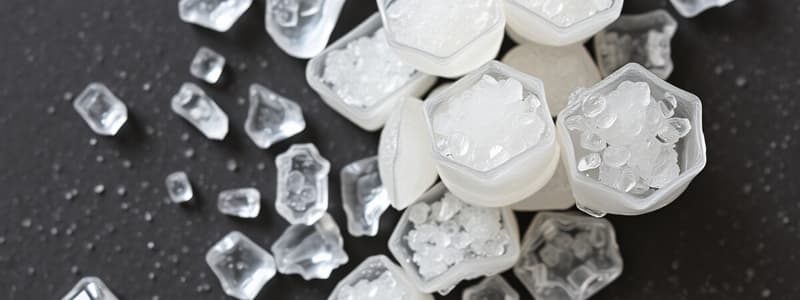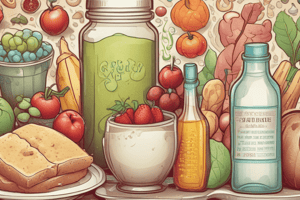Podcast
Questions and Answers
What are carbohydrates comprised of?
What are carbohydrates comprised of?
What are the components of simple sugars?
What are the components of simple sugars?
Monosaccharides and Disaccharides
What are simple sugars?
What are simple sugars?
Sugars that contain only one or two saccharide molecules
What are monosaccharides?
What are monosaccharides?
Signup and view all the answers
What are disaccharides?
What are disaccharides?
Signup and view all the answers
What is glucose?
What is glucose?
Signup and view all the answers
What is fructose commonly known as?
What is fructose commonly known as?
Signup and view all the answers
What is galactose?
What is galactose?
Signup and view all the answers
What is maltose composed of?
What is maltose composed of?
Signup and view all the answers
What is lactose?
What is lactose?
Signup and view all the answers
What are complex carbohydrates also known as?
What are complex carbohydrates also known as?
Signup and view all the answers
What do polysaccharides taste like?
What do polysaccharides taste like?
Signup and view all the answers
What are the components of complex sugars?
What are the components of complex sugars?
Signup and view all the answers
What is starch?
What is starch?
Signup and view all the answers
What is glycogen?
What is glycogen?
Signup and view all the answers
What is fiber generally considered to be?
What is fiber generally considered to be?
Signup and view all the answers
What is insoluble fiber?
What is insoluble fiber?
Signup and view all the answers
What is soluble fiber?
What is soluble fiber?
Signup and view all the answers
What are the main sources of carbohydrates?
What are the main sources of carbohydrates?
Signup and view all the answers
What is dietary fiber?
What is dietary fiber?
Signup and view all the answers
What is functional fiber?
What is functional fiber?
Signup and view all the answers
Study Notes
Carbohydrates Overview
- Composed of carbon, hydrogen, and oxygen, classified as simple sugars or complex carbohydrates (CHO).
- Serve as energy-yielding nutrients, fundamental to various bodily functions.
Simple Sugars
- Simple sugars include monosaccharides and disaccharides.
- Monosaccharides: One sugar molecule (e.g., glucose, fructose, galactose).
- Disaccharides: Two sugar molecules (e.g., sucrose, maltose, lactose).
Monosaccharides
- Absorbed directly without digestion.
- Hexoses are common; contain six carbon atoms.
- Major types include:
- Glucose: Circulates in blood, provides energy, key component of all disaccharides, transformed from other digestible carbohydrates.
- Fructose: Known as "fruit sugar," the sweetest natural sugar, found in high-fructose corn syrup.
- Galactose: Combines with glucose to form lactose, minimal occurrence in foods.
Disaccharides
- Must be broken down into monosaccharides for absorption.
- Types include:
- Sucrose: Common table sugar.
- Maltose: Composed of two glucose molecules, not naturally occurring in foods.
- Lactose: Milk sugar made from glucose and galactose, least sweet sugar present in milk.
Complex Carbohydrates (Polysaccharides)
- Long chains of glucose, consist of hundreds to thousands of glucose molecules.
- Types include:
- Starch: Storage form of glucose in plants; major food source including grains, potatoes, and legumes.
- Glycogen: Animal storage form of glucose; maintained in liver for blood sugar regulation.
- Fiber: Indigestible polysaccharides that help regulate digestion.
Fiber
- Generally classified into soluble and insoluble fiber.
- Insoluble Fiber: Non-digestible, does not dissolve in water, promotes stool bulk.
- Soluble Fiber: Dissolves into a viscous substance, aids in glucose regulation, cholesterol lowering, and satiety.
Sources of Carbohydrates
- Primary sources include grains, vegetables, fruits, and dairy.
- Grains are synonymous with carbohydrates; include whole or refined classifications.
- Nuts, dried peas, and beans also contribute to carbohydrate intake.
Dietary vs. Functional Fiber
- Dietary Fiber: Natural components of plants, non-digestible by human enzymes.
- Functional Fiber: Isolated fibers with beneficial health effects, proposed by the Food and Nutrition Board.
Studying That Suits You
Use AI to generate personalized quizzes and flashcards to suit your learning preferences.
Description
This quiz covers the basics of carbohydrates, including the composition, types, and functions of simple sugars and complex carbohydrates. It focuses on monosaccharides and disaccharides, detailing their characteristics and roles in the diet. Test your knowledge of these essential nutritional compounds!




